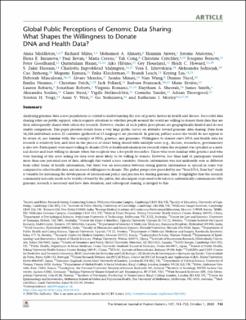| dc.description.abstract | Analyzing genomic data across populations is central to understanding the role of genetic factors in health and disease. Successful data sharing relies on public support, which requires attention to whether people around the world are willing to donate their data that are then subsequently shared with others for research. However, studies of such public perceptions are geographically limited and do not enable comparison. This paper presents results from a very large public survey on attitudes toward genomic data sharing. Data from 36,268 individuals across 22 countries (gathered in 15 languages) are presented. In general, publics across the world do not appear to be aware of, nor familiar with, the concepts of DNA, genetics, and genomics. Willingness to donate one’s DNA and health data for research is relatively low, and trust in the process of data’s being shared with multiple users (e.g., doctors, researchers, governments) is also low. Participants were most willing to donate DNA or health information for research when the recipient was specified as a medical doctor and least willing to donate when the recipient was a for-profit researcher. Those who were familiar with genetics and who were trusting of the users asking for data were more likely to be willing to donate. However, less than half of participants trusted more than one potential user of data, although this varied across countries. Genetic information was not uniformly seen as different from other forms of health information, but there was an association between seeing genetic information as special in some way compared to other health data and increased willingness to donate. The global perspective provided by our “Your DNA, Your Say” study is valuable for informing the development of international policy and practice for sharing genomic data. It highlights that the research community not only needs to be worthy of trust by the public, but also urgent steps need to be taken to authentically communicate why genomic research is necessary and how data donation, and subsequent sharing, is integral to this.Analyzing genomic data across populations is central to understanding the role of genetic factors in health and disease. Successful data sharing relies on public support, which requires attention to whether people around the world are willing to donate their data that are then subsequently shared with others for research. However, studies of such public perceptions are geographically limited and do not enable comparison. This paper presents results from a very large public survey on attitudes toward genomic data sharing. Data from 36,268 individuals across 22 countries (gathered in 15 languages) are presented. In general, publics across the world do not appear to be aware of, nor familiar with, the concepts of DNA, genetics, and genomics. Willingness to donate one’s DNA and health data for research is relatively low, and trust in the process of data’s being shared with multiple users (e.g., doctors, researchers, governments) is also low. Participants were most willing to donate DNA or health information for research when the recipient was specified as a medical doctor and least willing to donate when the recipient was a for-profit researcher. Those who were familiar with genetics and who were trusting of the users asking for data were more likely to be willing to donate. However, less than half of participants trusted more than one potential user of data, although this varied across countries. Genetic information was not uniformly seen as different from other forms of health information, but there was an association between seeing genetic information as special in some way compared to other health data and increased willingness to donate. The global perspective provided by our “Your DNA, Your Say” study is valuable for informing the development of international policy and practice for sharing genomic data. It highlights that the research community not only needs to be worthy of trust by the public, but also urgent steps need to be taken to authentically communicate why genomic research is necessary and how data donation, and subsequent sharing, is integral to this. | en_US |

